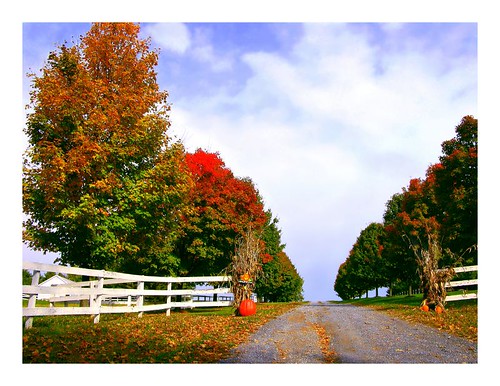
Welcome to the first Interfaith Blog Event! In each installment of this series, which we're hoping to do on a monthly basis, we'll explore a single topic across three different religious traditions. I am, obviously, writing from the Mahayana Buddhist tradition. Jon, from
Jesusfollowers Journal, will be writing from a Protestant Christian perspective, and Sojourner from
A Pagan Sojourn, will be writing from a Pagan perspective.
The first topic we'll be discussing is the following:
How do you view karma, the thought that your actions in some way determine your experiences, in your spiritual path?
[Jon's Essay] [Sojourner's Essay]Buddhism is about relationship: relationship to others, relationship to self, relationship to all sentient beings, and relationship to all insentient beings. Primary to Buddhism’s experience of relationship is what Thich Nhat Hanh terms interbeing—all of us, and by "us" I mean sentient as well as insentient beings, are interconnected. Nothing can exist without something else existing to comprise it. Thich Nhat Hanh writes,
If we look into this sheet of paper, we can see the sunshine in it. If the sunshine is not there, the forest cannot grow. In fact, nothing can grow. Even we cannot grow without sunshine. And so, we know that the sunshine is also in this sheet of paper. The paper and the sunshine inter-are. And if we continue to look, we can see the logger who cut the tree and brought it to the mill to be transformed into paper. And we see the wheat. We know that the logger cannot exist without his daily bread, and therefore the wheat that became his bread is also in this sheet of paper. And the logger's father and mother are in it too. When we look in this way, we see that without all of these things, this sheet of paper cannot exist. ... You cannot point out one thing that is not here—time, space, the earth, the rain, the minerals in the soil. ... Everything co-exists with this sheet of paper. [1]
Since everything inter-is, nothing exists in and of itself, independent of all else. Hence, everything exists based on prior causes and conditions. Interbeing forms the basis of Buddhist karma.
What is Buddhist karma? It is often summarized as "This is, because that is; this is not, because that is not." In the same way as all things come into being based on causes and conditions, all of our thoughts, actions, and feelings arise based on causes and conditions. In other words, if you're raised in a household in which your dad responds in open anger to many things, you are likely to develop the same trait. Or if you learn that feigned kindness gets you what you want, you'll repeat that behavior; and the more you repeat it, the more deeply a feigned kindness response will be embedded in your psyche. In psychological terms, you could say you learned this behavior through Skinner's operant conditioning. In Buddhist terms, you've accrued negative karma.
Karma does
not imply predestination, however. Technically, Buddhist karma is nonlinear. Note, however, that by "nonlinear" I do not mean that future events affect the present in a circular fashion. Rather,
present input—your
current thoughts, behavior, and intentions—feed into, and thus combine with, past causes and conditions to affect the next moment. This present input makes karma nonlinear according to systems theory, as it (karma) is not based solely on past causes. The existence of the "present input" also eliminates predestination because we can affect, and even change, our next thought, action, or speech that our past would have made most likely.
In other words, in every moment, we will be predisposed to certain thoughts, actions, and speech. If we act according to this predisposition, we strengthen it (i.e. "greed begets greed"). But we also have the ability to be mindful of this process and act differently from our predisposition, or at least consciously choose to think or act or speak according to our predisposition. Hence, our present thoughts, speech, and behavior can work to support our karmic predisposition, or counteract it.
I should note here that the terms "positive" and "negative" karma have no absolute value. These can only be relative terms because with no godhead to decree right from wrong, no absolute basis exists from which to dogmatically define "good" versus "bad." The question that cries out to be answered is, therefore, how do we know which behaviors, thoughts, and speech will develop what we might call "good karma."
In short, the answer is observation and analysis. The Buddha observed for himself that certain thoughts, speech, and behaviors generally led to a decrease in
suffering, both in himself and others, and to an increase in inner happiness. It was on the basis of these observations that he developed the precepts not to kill, not to steal, not to engage in sexual misconduct, not to use intoxicants, and not to lie. He did not intend for the precepts to be dogmatic rules to be followed unswervingly because, as previously noted, they contain no inherent value, good or bad, in and of themselves. Rather, he observed that when one kills, one's underlying mental state is such that one's suffering increases, in addition to the suffering clearly inflicted on the killed being. Related to this, he also observed that when killing became abhorrent to a person, that person's underlying mental state was one that reflected true inner happiness, peace, contentment, and love. Additionally, not only did this reduce the suffering of other beings (since they were not killed), it also increased others' happiness because of the manner in which our non-killing person now interacted with those beings around him, in his loving, peaceful state. Similar observations underlie the remaining precepts.
In a sense, the Buddha was an early proponent of the scientific method. He observed that all beings suffered. He developed the hypothesis that suffering could be ended and true, complete, inner happiness achieved. Then he began experimenting. He trained with many great teachers of his day, and though he found value in their Hindu thought, they did not confirm his hypothesis—they did not eradicate suffering completely, nor result in complete inner happiness. Just as importantly, they did not invalidate his hypothesis because he was successful in reducing his suffering and increasing his inner peace.
Finally, after 6 years of experimentation and testing, while meditating throughout the night under the Bodhi tree, he personally experienced the affirmation of his hypothesis. He obtained direct knowledge that suffering could be ended and true, complete, inner happiness achieved. And he directly determined the path that leads to this result.
The process of karma has been shown to exist by the great psychologists of our day. Freud showed us how our experiences in childhood directly affect our thoughts, actions, and speech in adulthood. Jung showed us how archetypes function in our unconscious to predispose us to certain responses. Skinner and Pavlov gave us the means by which we actually learn many of our responses via operant and classical conditioning, respectively. Even our everyday common sense tells us that a karmic process operates in our lives. How many times have you thought, "Oh, that runs in our family!" The Buddha, however, not only observed the functioning of karma in our lives, he also personally discovered that suffering is caused by karmic influences. Through experimentation and observation, he obtained direct knowledge that we could end our suffering and achieve total inner peace, love, happiness, and compassion. And he taught us the path so that we could achieve the same.
The Heart of Understanding. Thich Nhat Hanh. 1988.


















